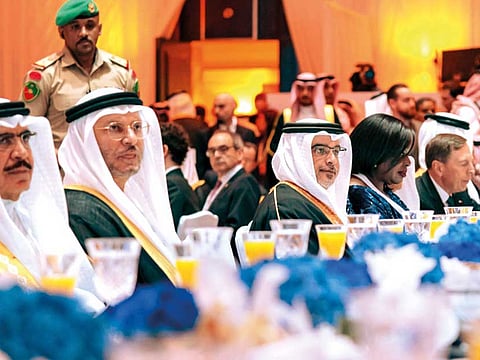Bahrain: Shared approaches needed to combat extremism
Jordan: Hope for solutions cannot be unilateral, must be multilateral

Manama: Bahrain’s Crown Prince Salman Bin Hamad Al Khalifa said the unrelenting global terrorist activity reinforced the importance of shared approaches to tackle the destructive ideology that drives it.
Addressing senior foreign policy and defence community delegates to Bahrain’s 14th Manama Dialogue security conference, Prince Salman said the annual security conference in the Bahraini capital this year takes place “at a crucial juncture as extremist ideologies continue to challenge the region’s stability in spite of an acceleration in development and living standards driven by innovative economic policies.”
Prince Salman, who is also Bahrain’s Deputy Supreme Commander and First Deputy Prime Minister, added that effective counter-terrorism policy relied on strong diplomatic engagement and multilateral collaboration.
Combating violent extremism should include providing young people with the opportunity to become active and responsible global citizens, he said, adding that Bahrain’s development programme includes wide ranging initiatives that contribute to improving opportunities and increasing young people’s participation in the Kingdom’s development.
Bahrain’s own counter-terrorism efforts are not carried out in isolation and encompass a broad spectrum of military, political, and economic collaboration with Arab partners and international allies, he added.
The conference was launched on Friday evening by a speech delivered on behalf of Jordanian King Abdullah II by King Abdullah II, by Minister of Foreign and Expatriate Affairs Ayman Safadi.
King Abdullah cancelled his visit to Bahrain and stayed in Amman to follow up on the Dead Sea tragedy in which scores of people, including young schoolchildren, were killed or injured or went missing.
King Abdullah’s speech warned that successful solutions to serious long-term, complex, and inter-related challenges that are also global in scope and have deep roots must be just as holistic, just as global, and just as deep.”
“To achieve security, the international community must also address justice, and inclusion, and opportunity. To create opportunity and economic growth, the world must also ensure stability and confidence. And to provide truly global justice and inclusion, we, as a world, must always stand up for the values on which human coexistence depends.”
He added that mutual respect, collective action, and long-term commitment were central to security issues.
“In our region, we have seen significant military victories over the khawarej, the outlaws of Islam. But there is still vital work to do, to consolidate the gains and help crisis-torn communities rebuild. And let’s not forget that as these challenges and threats are addressed, the operational threat remains global. If the international community ignores today’s hotspots, they will only spread.”
King Abdullah warned that the fight was generational and the ideological aspect was key. “The khawarej rely on a pseudo-religious ideology to justify murderous acts and foment sectarianism. We need to do more than expose their lies and crimes; we need to counter their false narrative with a true one that offers human solidarity and hope,” he said.
The principles of coexistence must also guide collective action and the countries of the world have a security interest, as well as a moral duty, to ensure that all people, especially young people, share in the promise of this century, he said.
King Abdullah said that another critical security concern for the region and the world was the long denial of Palestinian statehood.
“This conflict has been a global disrupter of peace and stability. When occupation and violence continue for generations and the peace process hits a dead-end again and again, this is not just the failure of the parties. It is a failure of global strategic relationships and credibility,” he said.
“We cannot expect better until our world does much, much, more to guide the parties towards a just and durable two-state solution, one that meets the needs of both sides, is fully in accord with international law and resolutions, provides an end to the conflict, and creates a viable, independent, sovereign Palestinian state, on the 1967 lines, with East Jerusalem as its capital.”
The fallacy of a single, bi-national state is a negative effort to delay and subvert the hope the two-state solution offers, he said.
“Any such solution, based on unilateral acts and unequal rights, would be a moral disaster and a recipe for continued conflict. Lasting peace cannot be unilateral; it can only be built by respecting the rights, hopes, and needs of both sides. This is the real security of peace. In order for people to live in peace, they must be empowered to prepare for the day of peace. For that, Palestinian schools need to be open, and families and communities need our protection. UNRWA must be fully funded.”
The Manama Dialogue, co-organised by the Ministry of Foreign Affairs and the International Institute for Strategic Studies (IISS), has been providing annually a platform to address the security challenges facing the region and the international community.



